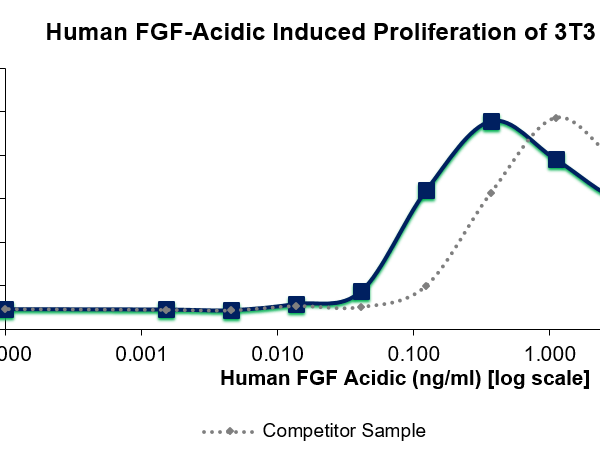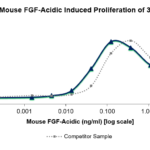Human aFGF / FGF1 Bioactive Protein Product Attributes
Product Type: Bioactive Protein
Recombinant aFGF / FGF1 based upon sequence from: Human
Host: QP5339 protein expressed in E. coli.
Tag: Untagged
Recommended Applications: Bioactive
Application Notes: Please contact us for application specific information for QP5339.
Bioactivity Data: BioActivity: Shows bioactivity at a concentration of 2 ng/mL in the BALB/c 3T3 cell proliferation assay. The bioactivity acceptance criteria is set at 5.0 x 10^5 units/mg.
Monomer or Dimer: Monomer
Amino Acid Sequence: MFNLPPGNYK KPKLLYCSNG GHFLRILPDG TVDGTRDRSD QHIQLQLSAE SVGEVYIKST ETGQYLAMDT DGLLYGSQTP NEECLFLERL EENHYNTYIS KKHAEKNWFV GLKKNGSCKR GPRTHYGQKA ILFLPLPVSS D
Purity: Greater than 95% as determined by SDS-PAGE.
Reconstitution Instructions:
Concentration of Human aFGF / FGF1 Protein: Lyophilized. Concentration determined by reconstitution volume.
Endotoxin Levels: Less than or equal to 1.00 EUs/ug as determined by the LAL method.
Buffer: 10 mM sodium phosphate, 75 mM sodium chloride, pH 7.5
Storage Conditions: Store at -20C to -80C lyophilized. Guaranteed for 1 year at -80C reconstituted and 3 months at 4C reconstituted.
| Recombinant Human aFGF / FGF1 Protein General Information | |
|---|---|
| Alternate Names | |
| aFGF, FGF1 Protein, AFGF, FGF-1, ECGFA, FGF-alpha, HBGF-1, ECGFB, ECGF, ECGF-beta, FGFA, HBGF1, GLIO703 | |
| Curated Database and Bioinformatic Data | |
| Gene Symbol | FGF1 |
| Entrez Gene ID | 2246 |
| Ensemble Gene ID | ENSG00000113578 |
| RefSeq Protein Accession(s) | NP_000791.1 |
| RefSeq mRNA Accession(s) | NM_000800.4, NM_001144892.2, NM_001144934.1, NM_001144935.1, NM_001257205.1, NM_001257207.1, NM_001257208.1, NM_001257209.1, NM_001257210.1, NM_033136.3, NM_033137.2 |
| UniProt ID(s) | P05230 |
| UniGene ID(s) | Hs.483635 |
| HGNC ID(s) | HGNC:3665 |
| COSMIC ID Link(s) | FGF1 |
| KEGG Gene ID(s) | hsa:2246 |
| PharmGKB ID(s) | PA28105 |
| General Description of Recombinant Human aFGF / FGF1 Protein. | |
| Acidic fibroblast growth factor (aFGF), also known as FGF1, is a potent inducer of DNA synthesis, cell proliferation, and has chemotactic activities. aFGF regulates cardiogenesis through protein kinase C signaling. aFGF also functions as an insulin sensitizer and mediates adipose tissue remodeling. High serum levels of aFGF are associated with type 2 diabetes mellitus (T2DM), suggesting a pathogenic role of aFGF during T2DM. | |
Limitations and Performance Guarantee
This is a life science research product (for Research Use Only). This product is guaranteed to work for a period of two years when stored at -70C or colder, and one year when aliquoted and stored at -20C.






There are no reviews yet.